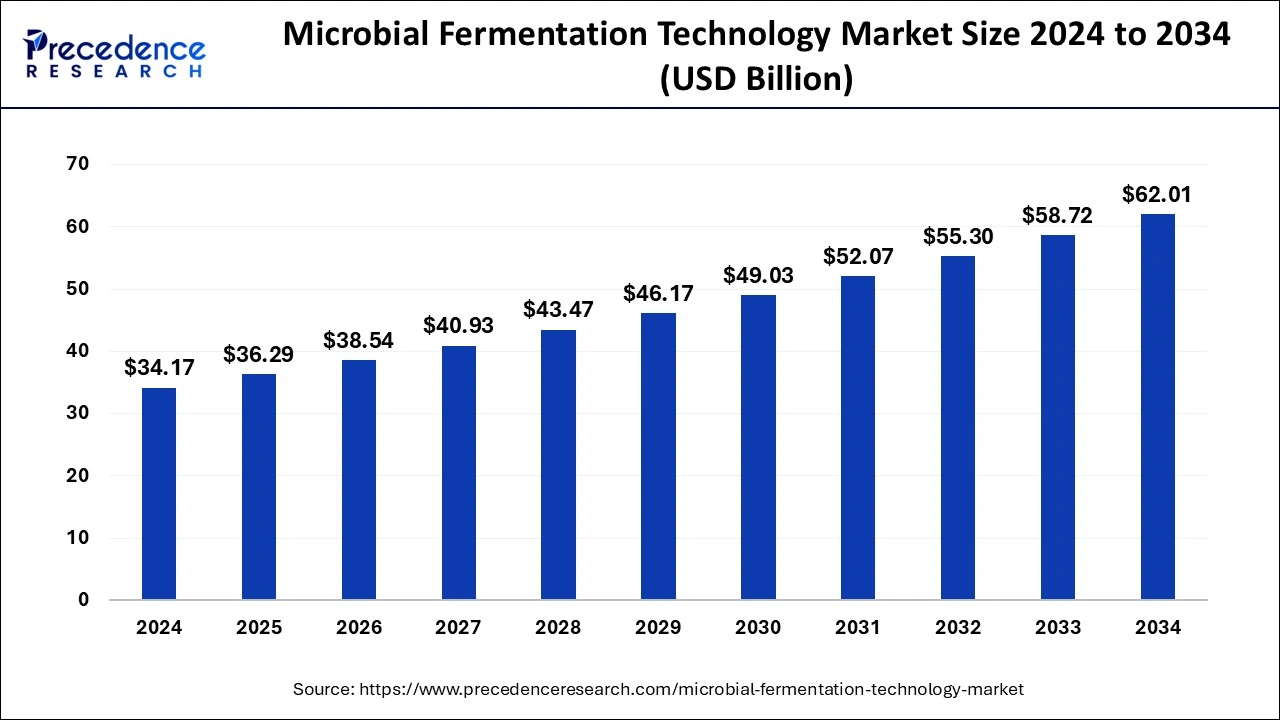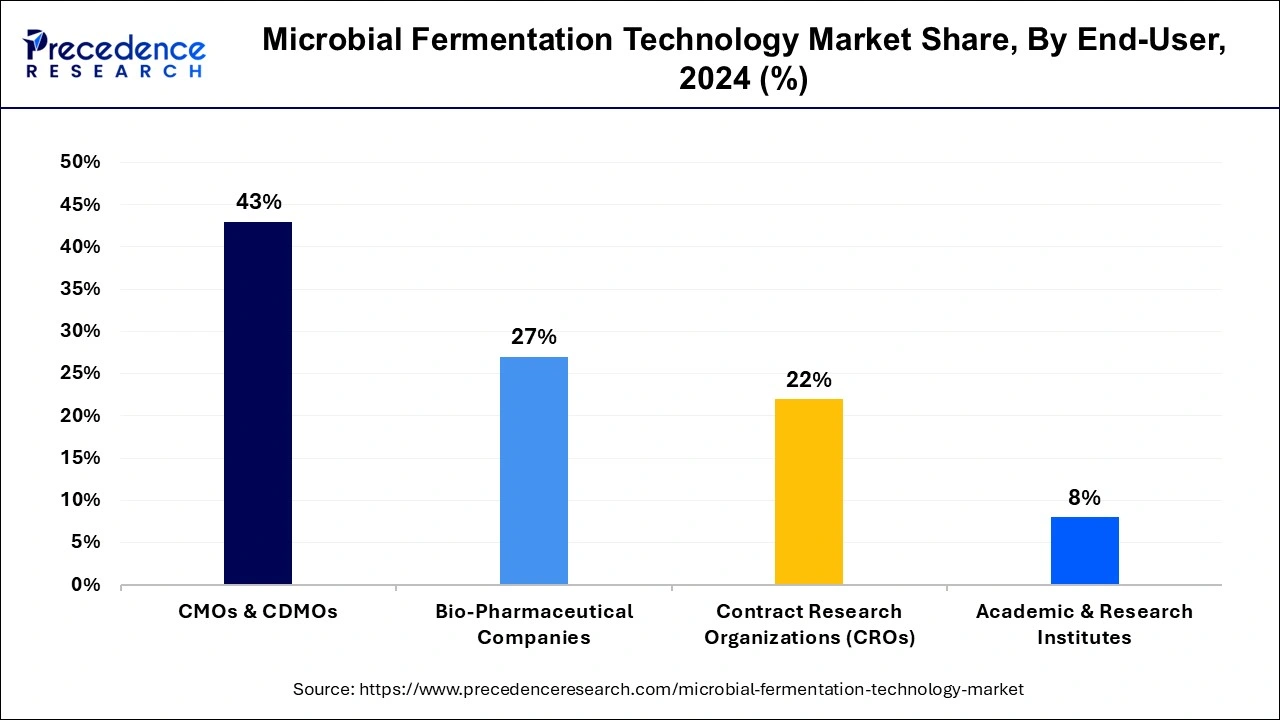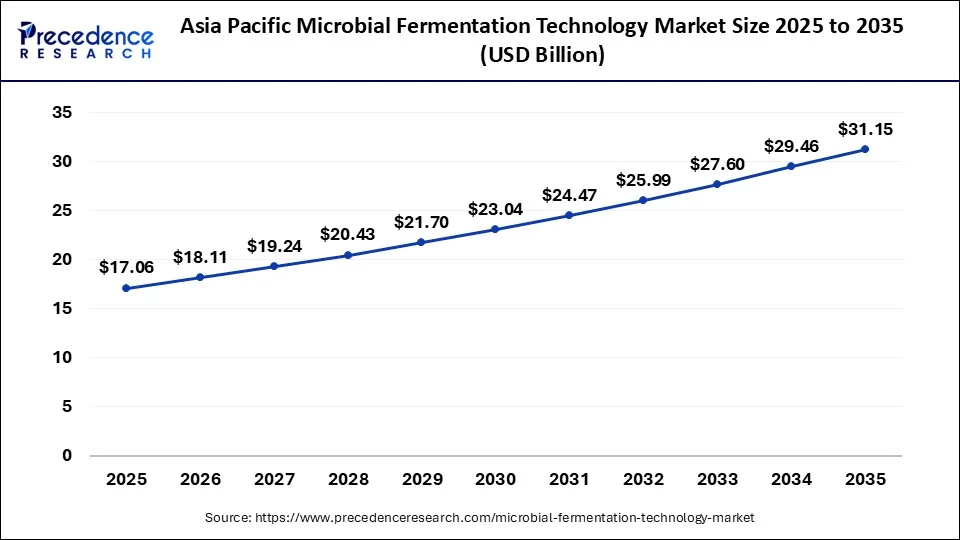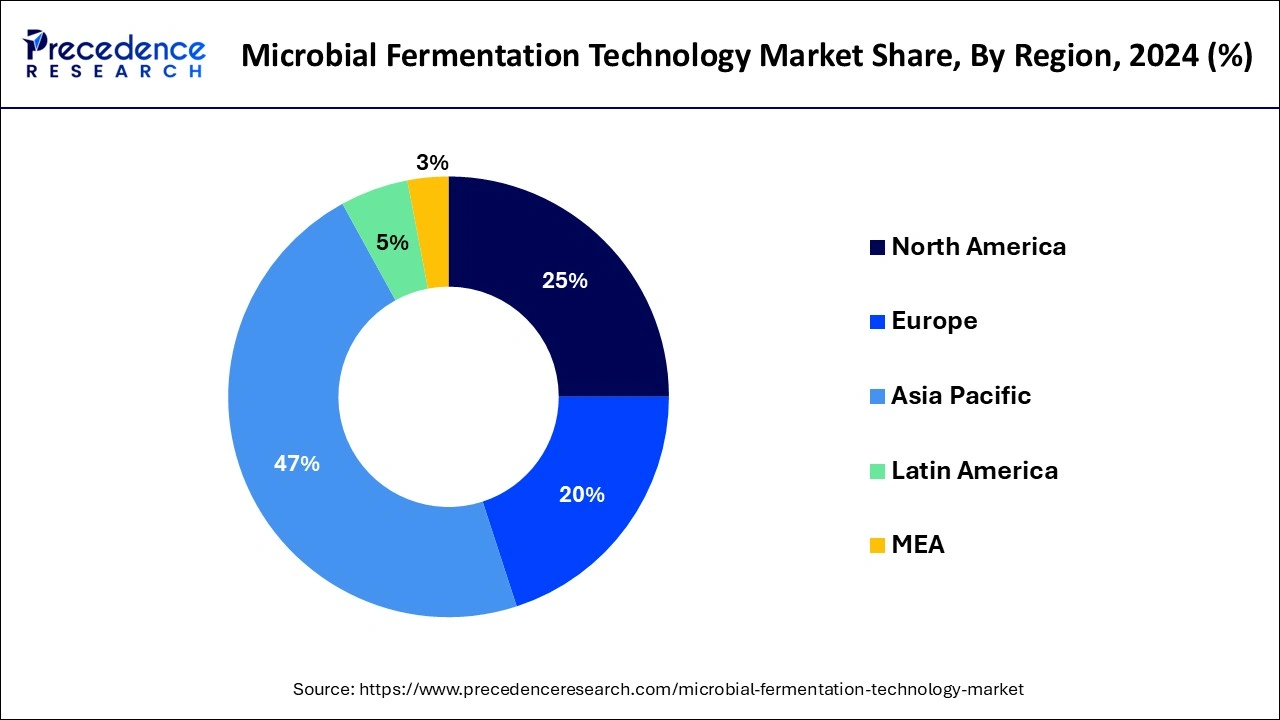What is the Microbial Fermentation Technology Market Size?
The global microbial fermentation technology market size is calculated at USD 36.29 billion in 2025 and is predicted to increase from USD 38.54 billion in 2026 to approximately USD 65.39 billion by 2035, expanding at a CAGR of 6.07% from 2026 to 2035.

Microbial Fermentation Technology Market Key Takeaways
- Asia Pacific dominated the global microbial fermentation technology market with the largest market share of 47% in 2025.
- Asia-Pacific governed the microbial fermentation technology market in 2025 and is anticipated to sustain its dominance during the estimated period.
- By Application, the antibiotics segment had the largest share in the forecast period.
- By End-user, the CMOs and CDMOs segment generated more than 43% of revenue share in 2025 and is predicted to record maximum growth throughout the estimated period.
Market Overview
Microbial fermentation is the anaerobic metabolic process to induce chemical changes in the presence of enzymes. Energy is extracted from carbohydrates. Microbial fermentation has several applications, including preparing antibiotics and manufacturing bread, curd, yogurt, and pickles in producing beverages such as wine, beer, alcoholic biofuels, tanning of leather, curing tea, etc. Out of the numerous applications, it dominates the food, beverages, and pharmaceutical industries, which fuels the growth of the microbial fermentation technology market.
Key microbial fermentation technology market players include Novozymes A/S, DowDuPont Inc., and Chr. Hansen Holding A/S, DSM, Evonik Industries AG, and Givaudan SA. These companies invest in research and development to develop new and innovative products and technologies to meet the growing demand for sustainable solutions.
In September 2022, Cyclone Engineers, Cargill, and Genomatica, united on a project to increase bioreactor fermentation performance. The National Biotechnology and Biomanufacturing Initiative permitted US$ 2.5 million to hold up this research.
Microbial Fermentation Technology Market Growth Factors
The increasing demand for fermented food & beverage products and growing consumer health consciousness propel the growth of the microbial fermentation technology market. The advantage offered by microbial fermentation technology of providing longer shelf life to food products supports the market's growth. Growing demand for natural and organic food products as the growing demand for natural and organic food products is driving the microbial fermentation technology market because this technology is crucial in the production of natural and organic food products. It involves use of microorganisms like bacteria, yeasts, and fungi to transform food substances into desirable outcomes, such as cheese, yogurt, vinegar, and alcoholic beverages.
Consumers are increasingly concerned about their food's safety and quality and are willing to pay more for natural and organic products. Microbial fermentation technology enables the production of food products free from synthetic additives, preservatives, and other harmful chemicals. This makes them healthier and more appealing to consumers. Furthermore, microbial fermentation technology allows food manufacturers to produce food products with unique flavors, textures, and nutritional profiles.
For instance, probiotics produced through microbial fermentation have been shown to improve gut health and boost the immune system. This has led to an increase in demand for fermented foods and beverages, especially among health-conscious consumers. The microbial fermentation technology market is expected to grow as consumers demand more natural and organic food products.
Market Outlook
- Industry Growth Overview: The market is experiencing robust growth, driven by rising demand for biopharmaceuticals, biofuels, and sustainable food ingredients.
- Major investors: Major investors and key players in the microbial fermentation technology market include large corporations like Lonza Group, DSM, Novozymes (Novonesis), DuPont (now IFF), Evonik Industries, Roche, Biocon, and Givaudan.
- Global Expansion: The global focus on sustainable production methods is creating significant opportunities for microbial fermentation technology to produce eco-friendly replacements for traditional petroleum-derived products.
Market Scope
| Report Coverage | Details |
| Market Size in 2025 | USD 36.29 Billion |
| Market Size in 2026 | USD 38.54 Billion |
| Market Size by 2035 | USD 62.01 Billion |
| Growth Rate from 2026 to 2035 | CAGR of 6.07% |
| Largest Market | North America |
| Fastest Growing MarketAsia-Pacific | Asia Pacific |
| Base Year | 2025 |
| Forecast Period | 2026 to 2035 |
| Segments Covered | By Application and By End-User |
| Regions Covered | North America, Europe, Asia-Pacific, Latin America, and Middle East & Africa |
Market Dynamics
Market Drivers
Rising prevalence of infectious disease
Infections, usually respiratory tract infections, urinary tract infections, surgical site infections, gastrointestinal infections, and bloodstream infections are caused by microbes such as bacteria and fungi, ranging from mild to severe. The rising prevalence of infectious diseases has increased the demand for more fermented microbial products like antibiotics and vaccines to treat patients from infections, further expanding the market worldwide.
Microorganisms such as Salmonella and Mycobacterium bovis BCG are used in the production of vaccines, and after the fermentation, it is easier to cultivate the microbes to produce vaccines. As the demand for antibiotics along with the rising development for novel drugs grows, the growth of microbial fermentation technology market is expected to grow.
Market Restraints
High cost of production
In many parts of the world, particularly in developing countries the specialized instruments and facilities needed for fermentation are expensive as the fermenter needs sterilization using high-pressure steam between batches. Inadequate funding from the government and minimal knowledge about the proper handling of microorganisms create a gap and hinder market growth. The cost of raw materials required for fermentation, such as sugars, insulin, starch and other supplements, can be a significant cost driver.
Sometimes, these materials may be difficult or expensive to source, leading to supply chain challenges and higher costs. Running a fermentation plant requires ongoing costs such as labor, utilities, maintenance, and quality control. These costs can add up quickly and may be higher for facilities that require specialized expertise or operate under stringent regulatory requirements. Once fermentation is complete, additional processing steps may be necessary to isolate and purify the desired product. These downstream processing steps can be complex and expensive and require specialized equipment and expertise.
Market Opportunities
Increasing focus on healthcare research
Healthcare research is vital because it provides a platform for disease trends, advanced and easy detection, risk factors, treatment, clinical trials, cost & care, and health transformation, which was absent in the last decade. With the growing demand for healthcare products such as vaccines, interferons, antibiotics, insulin, and growth hormones, there is a rise in the production of these medicinal products. The advancements in healthcare information-based data are promoting the growth of personalized medicine, which is beneficial for the patient to get cured rather than dealing with the whole generic population. This eventually boosts the development of the microbial fermentation technology market.
Segment Insights
Application Insights
During the projection period, the antibiotics segment is expected to dominate the microbial fermentation technology market. The rising pharmaceutical sales will boost the production of antibiotics and subsequently drive the medical industry, propelling the demand for fermentation chemicals. There need to be more viable alternatives. While there are other antimicrobial agents available, such as disinfectants and bacteriophages, these tend to be less effective or more expensive than antibiotics. In addition, many of these alternatives have not been as extensively studied as antibiotics, so their long-term effects on fermentation still need to be understood.
Despite their widespread use, some concerns exist about the overuse of antibiotics in microbial fermentation technology. Overuse of antibiotics can lead to the development of antibiotic-resistant bacteria, which can pose a severe threat to human health. There is also a risk that antibiotics used in fermentation may end up in the final product, which could pose a health risk to consumers. The demand for fermentation chemicals is expected to increase for manufacturing antibiotics and steroids, thereby scaling up the microbial fermentation technology market.
End-User Insights
The CMOs & CDMOs dominate the end user segment throughout the forecast period. CMOs and CDMOs are rapidly becoming brilliant options for biotherapeutics makers as most of the innovation in the bioprocess space are done by smaller firms with a capacity constraint, a need for more trained professionals, and resources for commercializing these products. They have the flexibility to work with a wide range of clients, from startups to established companies, and can tailor their services to meet each client's specific needs.

CMOs and CDMOs offer customized solutions and also have a deep understanding of the regulatory environment for microbial fermentation-based products and can help their clients navigate the complex regulatory landscape. This is particularly important for companies new to the market or operating in a new geographic region, eventually expanding the market growth.
Regional Insights
Asia Pacific Microbial Fermentation Technology Market Size and Growth 2026 to 2035
The Asia Pacific microbial fermentation technology market size is estimated at USD 17.06 billion in 2025 and is predicted to be worth around USD 31.15 billion by 2035, at a CAGR of 6.21% from 2026 to 2035.

Asia Pacific dominated the microbial fermentation technology market with the largest share in 2025. The region's dominance is driven by growing demand in pharmaceuticals, chemicals, and food & beverage sectors, alongside rising investments in research and development. Initiatives such as India's industrial biotechnology efforts, which harness microorganisms to produce value-added bioactive ingredients like organic acids, industrial enzymes, single-cell proteins, and bulk chemicals, have significantly contributed to the advancement of biotechnology and biopharmaceuticals in the region.
The region is expected to continue its upward trajectory in the coming years, driven by rising demand in food and beverages, pharmaceuticals, and industrial enzymes. China and India are the key contributors, with their large populations and growing economies creating opportunities for expansion in the food and pharmaceutical sectors, thereby fueling the growth of the microbial fermentation technology market.
India Market Analysis
India is a major contributor to the Asia Pacific microbial fermentation market due to its expanding food, pharmaceutical, and biotechnology industries. The country's large population and growing economy drive high demand for value-added products such as enzymes, organic acids, and single-cell proteins. Additionally, strong government support for industrial biotechnology and increasing investment in R&D further boost India's role in the regional microbial fermentation market.

How is the Opportunistic Rise of North America in the Market?
North America is expected to witness significant growth in the forecast period. The growing engagement of companies in research and product development in biology coupled with the presence of a substantial number of contract development organizations in the region. The robust regulatory framework is another critical factor in shaping the North American market. The U.S. FDA attempts to work and improve guidelines regarding the development, approval, legal practice, promotion, and surrounding biopharmaceutical products.
The North American region is considered as a huge market for microbial fermentation technology. The increasing demand for pharmaceuticals, industrial enzymes, and biofuels drives the growth of this market. The United States is the largest market in this region due to significant players in the industry, such as Novozymes, DSM, and DuPont.
The market in North America is also driven by innovations in synthetic biology, precision fermentation, and biopharmaceutical manufacturing. Strong demand for biopharmaceuticals, vaccines, and fermented food ingredients supports market growth. The region benefits from an advanced R&D ecosystem, early adoption of sustainable bioprocessing technologies, and increasing interest in bio-based alternatives to chemicals, fuels, and specialty ingredients.
U.S. Market Analysis
The U.S. leads the market within North America, as it has been at the forefront of advanced fermentation research, with a large number of startups, significant investments made into biomanufacturing, and an emphasis on precision fermentation, cell-based products, and pharmaceutical biologics.
Why is Europe Considered a Significant Region in the Microbial Fermentation Technology Market?
Europe is a significant region in the market, driven by initiatives promoting a circular bioeconomy, green manufacturing, and sustainable use of biomass. Demand for microbial fermentation is rising across applications, including food production, pharmaceuticals, and bio-based materials. Additionally, government regulations encouraging reduced carbon emissions and environmentally friendly alternatives to chemical synthesis are further supporting market growth.
Germany Market Analysis
Germany is the leading country in the European market, boasting one of the largest pharmaceutical industries and advanced fermentation process technologies. The country focuses on enzyme development, optimizing efficient bioprocesses, and implementing sustainable, green manufacturing systems. This strong emphasis on innovation and sustainability reinforces Germany's leadership in the European microbial fermentation technology market.
What Opportunities Exist in the Middle East & Africa?
The Middle East & Africa (MEA) presents significant opportunities for the microbial fermentation technology market, driven by government and commercial interest in pharmaceutical manufacturing, food preservation, and agricultural biotechnology. Investments in local production capabilities are reducing dependence on imports and supporting the development of healthcare infrastructure. Steady demand for fermented food products, along with the expansion of healthcare facilities, continues to promote the adoption of microbial fermentation technologies across the region.
Saudi Arabia Market Analysis
The market in Saudi Arabia is driven by strong government support and investment in biotechnology, pharmaceuticals, and food processing. Growing demand for locally produced biologics, enzymes, and specialty ingredients is encouraging the adoption of advanced fermentation technologies. Additionally, initiatives to enhance healthcare infrastructure and promote sustainable manufacturing further fuel market growth.
What Potentiates the Market in Latin America?
The microbial fermentation technology market in Latin America is fueled by the region's expanding food, pharmaceutical, and biotechnology sectors. Growing demand for fermented food products, enzymes, and bio-based chemicals drives the adoption of fermentation technologies. Additionally, increasing investments by domestic and international manufacturers to enhance production capacity and meet local demand further support market growth.
China Microbial Fermentation Technology Market Trends
In the Asia Pacific, China is expected to grow at the fastest CAGR over the forecast period. The growth of the country can be attributed to the growing demand for bio-based products along with the surge in disposable income, fuelling the nutritional, food & beverages industries. Also, the country's extensive chemical industry offers a robust foundation, leading to further market growth.
Canada Microbial Fermentation Technology Market Trends
In North America, Canada is expected to grow at the fastest CAGR over the forecast period. The growth of the country can be credited to the surge in demand for biosmilars/bilogics and consumer shifts towards more natural foods. Moreover, increasing funding from government and private organisations for tech innovations and biomanufacturing is creating favourable opportunities in the market soon.
Brazil Microbial Fermentation Technology Market Trends
The growth of the market in the country can be driven by its wide agricultural industry, which offers low-cost and readily available feedstocks such as corn, sugarcane, and agro-industrial byproducts, ideal for fermentation. In addition, Brazil's robust ethanol industry offers expertise and infrastructure, boosting growth in fermentation-based products.
Top Companies in the Microbial Fermentation Technology Market & Their Offerings
- DSM-Firmenich: Focusing on nutrition and materials, DSM-Firmenich leverages microbial fermentation for vitamins and lipids. Key products include Veramaris algal oils, AmpliSolve B9, and Human Milk Oligosaccharides.
- Evonik Industries: This specialty chemicals group produces amino acids, omega-3s, and biomaterials using fermentation, including DL-methionine and AvailOm omega-3 products.
Microbial Fermentation Technology Market Companies
- Abolis Biotechnologies
- ABPDU
- AGC Biologics
- Bio-CAT Microbials
- Bio-Technical Resources
- Biocatalysts
- Bluestem Biosciences
- EKF Diagnostics
- Fujifilm Diosynth
- Microbial Discovery Group
- Osprey Biotechnics
- Wisconsin BioProducts
- Scientific Protein Laboratories
- Zero Acre Farms
- Zea2 Bioworks
- Hoffmann-La Roche AG
- Koninklijke DSM NV
- Biocon Ltd.
- BioVectra Inc.
- TerraVia Holdings Inc.
- United Breweries Ltd.
Recent Developments
- In May 2025, Angel Yeast showcased its new Feravor™ natural flavor yeast series at the Global Bakery Expo, offering floral and buttery strains to enhance clean-label baked goods with richer aroma.
(Source: en.antaranews.com ) - In January 2024, University College Cork launched a new multi-disciplinary fermentation research center, bringing together industry and academia to advance sustainable fermentation and microbial biomanufacturing for food and bioeconomy innovation.
(Source: ucc.ie ) - In September 2025,the UK Food Standards Agency launched a one-year precision fermentation initiative to build regulatory expertise, support innovation, and help navigate approvals for advanced fermentation technologies.
Source: https://www.foodingredientsfirst.com/news/fsa-precision-fermentation-initiative-launch.html - In February 2023, a precision fermentation alliance ‘The Precision Fermentation Alliance' was formed by food tech business, Nine Foodtech Startup to develop meaty flavors for meat substitutes. This alliance uses microbes including yeast, bacteria, fungi, and others to generate ingredients more effectively and sustainably.
- In January 2023, FrieslandCampina and Triplebar Bio announced the extension of their collaboration in order to develop and scale up the production of cell-based proteins through precision fermentation, the alliance aims to develop creative alternative protein solutions that enhance human health, target infant nutrition, and lessen reliance on conventional protein sources.
- In August 2022, IIT Guwahati researchers thrived a new technique from sugarcane extract to produce “Xylitol”, a sugar substitute, in which ultrasound accelerates the fermentation process and its yield.
- In February 2022, Rice University and the University of California, Davis, combined bacteria using two systems of fermentation which didn't existed before to produce energy.
- In February 2022, Oklahoma State University issued a patent that could significantly increase chemical and biofuel yield by reducing CO2 emissions.
Segments Covered in the Report
By Application
- Enzymes
- Probiotics Supplements
- Monoclonal Antibodies
- Biosimilars
- Antibiotics
- Vaccines
- Recombinant Proteins
- Small Molecules
By End-User
- Bio-Pharmaceutical Companies
- CMOs & CDMOs
- Contract Research Organizations (CROs)
- Academic & Research Institutes
By Geography
- North America
- Europe
- Asia-Pacific
- Latin America
- Middle East and Africa
For inquiries regarding discounts, bulk purchases, or customization requests, please contact us at sales@precedenceresearch.com
Frequently Asked Questions
Ask For Sample
No cookie-cutter, only authentic analysis – take the 1st step to become a Precedence Research client
 Get a Sample
Get a Sample
 Table Of Content
Table Of Content




 sales@precedenceresearch.com
sales@precedenceresearch.com
 +1 804-441-9344
+1 804-441-9344
 Schedule a Meeting
Schedule a Meeting